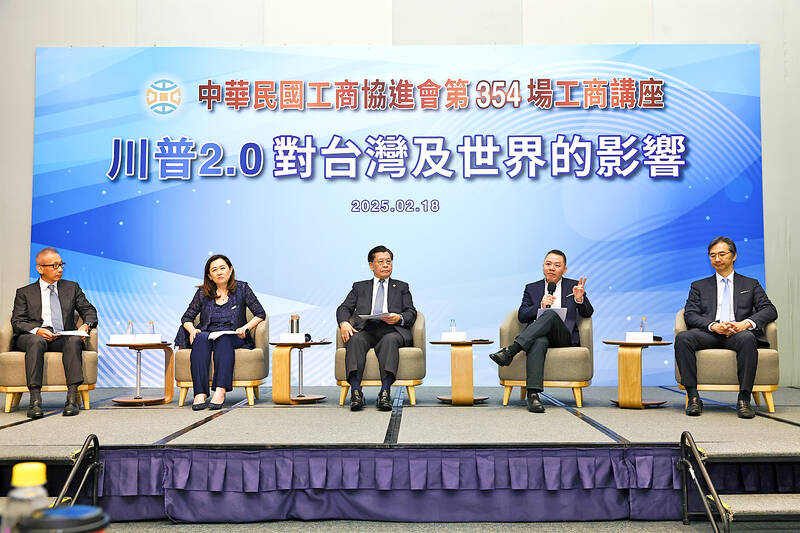Taiwan’s business leaders on Tuesday called on the government to speed up negotiations with Washington on double tax avoidance and investment protections as companies consider investment in the US to cope with tariff hikes.
The Taipei-based Chinese National Association of Industry and Commerce (CNAIC, 工商協進會) made the plea during a forum to discuss business challenges under US President Donald Trump’s second term.
“The government should create a task force to tackle semiconductor and national security, and other issues with the US, rather than leaving companies to cope with these challenges alone,” association vice chairman Huang Chiao-chang (黃教漳) said, adding that Taiwan has grown increasingly reliant on the US market.

Photo: CNA
Taiwan is the US’ sixth-largest trading partner with a trade surplus of US$73.9 billion last year, making it a potential target of tariff hikes, Huang said.
He urged the government to pursue a US-Taiwan trade agreement to reduce tax burdens on Taiwanese firms investing and operating in the US, adding that the two sides should also sign an investment protection pact to safeguard Taiwanese investments in the US.
Taiwan’s negotiators should seek tariff exemptions or tariff reductions wherever possible, he said.
In addition, the government should enhance economic, technological and innovation cooperation with the US, and help boost the competitiveness of local companies on the world stage, Huang said.
The Trump administration has announced plans to impose 25 percent tariffs on Canada and Mexico and has made known its intention to introduce “reciprocal tariffs” that could affect Taiwan’s technology, electronics and semiconductor industries.
Taiwan places a 5 percent tariff on US goods, while the US levies about 3 percent tariffs on Taiwanese imports, CNAIC standing board director Steve Pan (潘思亮) said.
If the US insists on reciprocal tariffs, Taiwan’s agricultural exports would be hit the hardest due to their thin margins, Pan said.
Trump could pressure Taiwan’s tech firms to invest in the US, which would have a greater impact, but appears inevitable in resolving the trade imbalance, he said.
The development of artificial intelligence would be a key growth driver in the US economy, which could benefit local firms in the supply chain, Pan added.
Taiwanese firms should leverage investments in the US to enhance ties with US customers, he said, adding that competitors from South Korea and elsewhere would seek to fill that void if local firms do not.

Anna Bhobho, a 31-year-old housewife from rural Zimbabwe, was once a silent observer in her home, excluded from financial and family decisionmaking in the deeply patriarchal society. Today, she is a driver of change in her village, thanks to an electric tricycle she owns. In many parts of rural sub-Saharan Africa, women have long been excluded from mainstream economic activities such as operating public transportation. However, three-wheelers powered by green energy are reversing that trend, offering financial opportunities and a newfound sense of importance. “My husband now looks up to me to take care of a large chunk of expenses,

SECTOR LEADER: TSMC can increase capacity by as much as 20 percent or more in the advanced node part of the foundry market by 2030, an analyst said Taiwan Semiconductor Manufacturing Co (TSMC, 台積電) is expected to lead its peers in the advanced 2-nanometer process technology, despite competition from Samsung Electronics Co and Intel Corp, TrendForce Corp analyst Joanne Chiao (喬安) said. TSMC’s sophisticated products and its large production scale are expected to allow the company to continue dominating the global 2-nanometer process market this year, Chiao said. The world’s largest contract chipmaker is scheduled to begin mass production of chips made on the 2-nanometer process in its Hsinchu fab in the second half of this year. It would also hold a ceremony on Monday next week to

TECH CLUSTER: The US company’s new office is in the Shalun Smart Green Energy Science City, a new AI industry base and cybersecurity hub in southern Taiwan US chip designer Advanced Micro Devices Inc (AMD) yesterday launched an office in Tainan’s Gueiren District (歸仁), marking a significant milestone in the development of southern Taiwan’s artificial intelligence (AI) industry, the Tainan City Government said in a statement. AMD Taiwan general manager Vincent Chern (陳民皓) presided over the opening ceremony for the company’s new office at the Shalun Smart Green Energy Science City (沙崙智慧綠能科學城), a new AI industry base and cybersecurity hub in southern Taiwan. Facilities in the new office include an information processing center, and a research and development (R&D) center, the Tainan Economic Development Bureau said. The Ministry

ADVERSARIES: The new list includes 11 entities in China and one in Taiwan, which is a local branch of Chinese cloud computing firm Inspur Group The US added dozens of entities to a trade blacklist on Tuesday, the US Department of Commerce said, in part to disrupt Beijing’s artificial intelligence (AI) and advanced computing capabilities. The action affects 80 entities from countries including China, the United Arab Emirates and Iran, with the commerce department citing their “activities contrary to US national security and foreign policy.” Those added to the “entity list” are restricted from obtaining US items and technologies without government authorization. “We will not allow adversaries to exploit American technology to bolster their own militaries and threaten American lives,” US Secretary of Commerce Howard Lutnick said. The entities